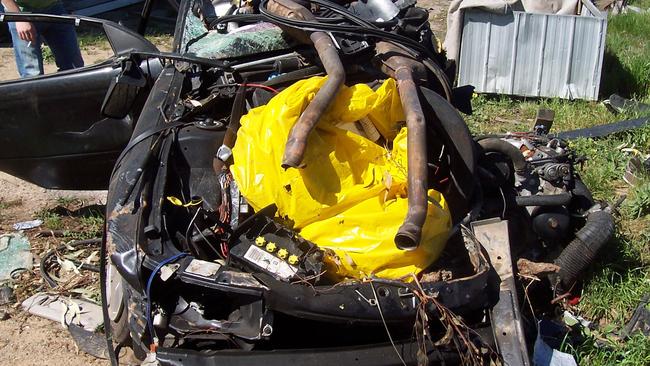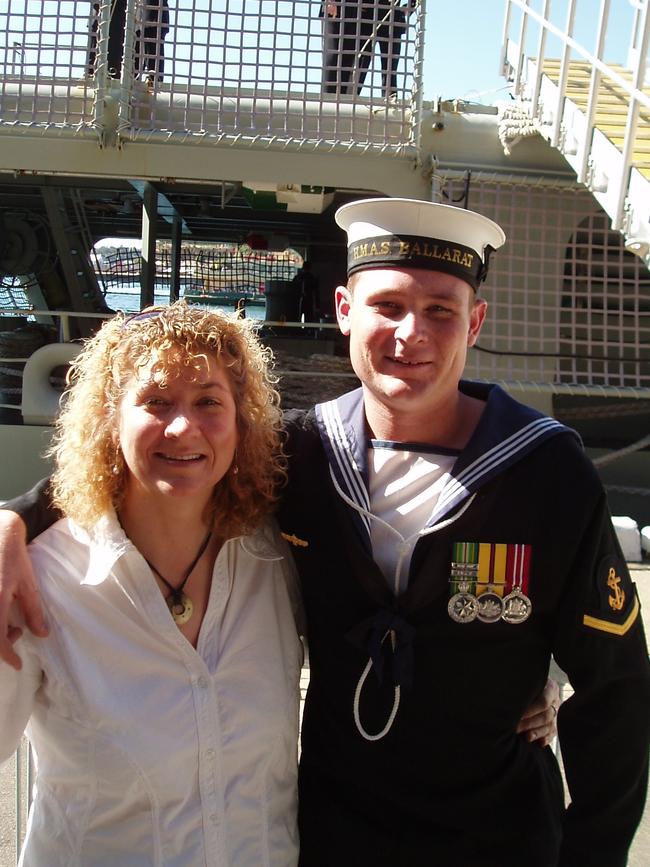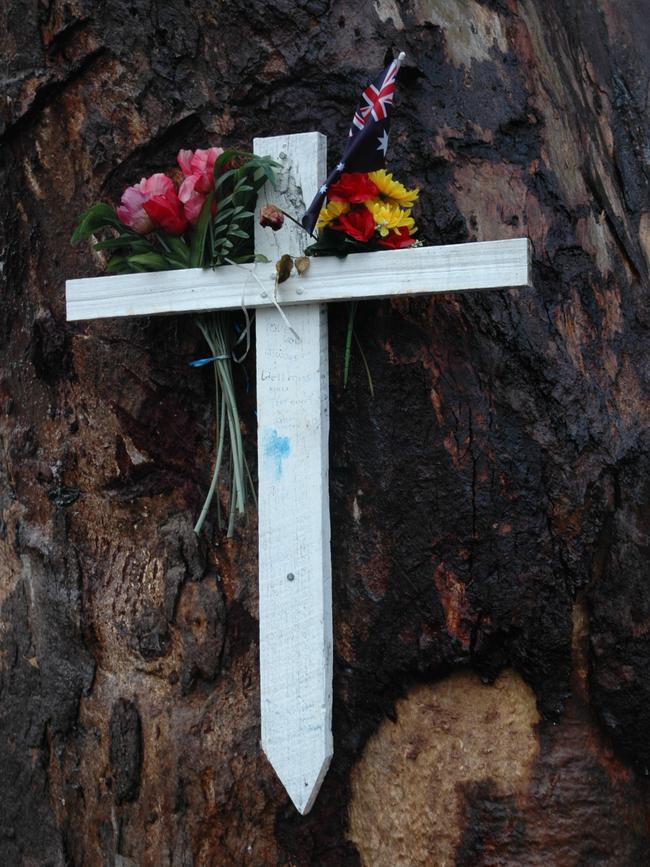How a chilling phone call changed Rosie Johnston’s life forever
A mother has urged others to learn from her son’s fatal decision to drive angry, tired and drunk before he died in a horrific high-speed crash on a country road.

Victoria
Don't miss out on the headlines from Victoria. Followed categories will be added to My News.
It was just after sunrise on a Saturday morning when Rosie Johnston received a chilling phone call that changed her life forever.
Her smart and charming 23-year-old son, Duncan Tynan, was dead.
Duncan worked with the Royal Australian Navy. He had been on an active tour of duty on the HMAS Ballarat in Iraq for six months and upon his return his family greeted him at Sydney Harbour. His proud mum held up a sign that said “love to be with Dunk” while the band played.
After spending some time with his mum and brother, including climbing Sydney Harbour Bridge, Duncan picked up his car from his mum’s house in Melbourne and set off to stay with his dad near Wangaratta and also catch up with some good mates.
Ms Johnston recalls giving him a quick hug and kiss goodbye and telling him she would see him the following week. It was the last time she saw her eldest son alive.
A fortnight later Duncan was to travel back to Melbourne to spend a few more days with his mum before he was to be transferred to Perth. He spent the night of September 15, 2006, catching up and drinking with old school and work mates.
He had responsibly booked a motel in central Wangaratta so he could walk to and from the pub but about 5am Duncan had an argument with one of his best mates.
In a fit of rage, intoxicated and sleep-deprived, Duncan snatched up his car keys and got behind the wheel of the V8 Commodore.
Travelling more than 160km/h on a rural road on the outskirts of town and likely distracted by his buzzing phone, Duncan missed a corner and lost control of the car.
He clipped the safety barrier, became airborne and smashed into a huge, 2m-wide red gum tree.
The impact caused the car to break into two pieces – the boot wrapped around the base of the tree while the front of the car catapulted through a barbed wire fence and landed in a cow paddock.
The force caused Duncan to be ejected out of his seatbelt and through the windscreen.
He landed a few metres away from the wreckage where he died, alone.
His lifeless body was found by a woman working on a nearby farm, who had rushed towards the scene after hearing the crash.

While it has now been almost 17 years since she lost her son, Ms Johnston is still haunted by the tragic night.
She distinctly remembers her initial reaction of disbelief and then the terrible calls to her youngest son Jason, then 20, and her own mother, to tell them their beloved brother and grandson was dead; screaming out her front door as concerned early-morning dog walkers looked on; organising a flight for her son to get to Wangaratta and then organising a lift for herself.
Ms Johnston remembers that hours-long car trip to Wangaratta, during which she grappled with shock, excessively high blood pressure and feeling so anxious that she vomited.
It wasn’t until she saw her son’s body as he lay in a morgue that she knew it was real.
Duncan was an organ donor and while his organs were rendered useless due to the way he died, his back tissue was donated to a burns victim.
This was some solace for Ms Johnston but in the weeks afterwards her grief morphed into anger at the mates who had not prised her son’s keys out of his hand, or stopped him from driving in the state he did.
“He had had no sleep, had been drinking alcohol and was speeding about 100km/h over the limit — so (he was doing) all the wrong things,” she said.
“He was getting calls to see where he was so he was probably taking his eyes off the road to look at his phone.”



According to the Monash University Accident Research Centre, reducing speed by 11 per cent would reduce road deaths by up to 40 per cent while only a split second of inattention can be life-changing.
Meanwhile, data from new mobile phone and detection cameras have detected almost a shocking number of drivers flouting the rules.
As the Saturday Herald Sun reported, almost 3000 drivers were detected not wearing seatbelts or driving while using a mobile phone during the cameras’ first month of operation.
Distracted driving continues to be a major factor in serious and fatal collisions. Last year nearly a quarter of vehicle occupants who died, and their seatbelt status was known, were not wearing a seatbelt.
Data shows drivers were 10 times more at risk of crashing if they were texting, browsing or emailing on their mobile phone.
Ms Johnston still misses her son – who she described as handsome, popular and always happy to lend a helping hand – every single day.
While quiet but also loving a party, Duncan was intelligent and planned to study to become a naval officer. It is just one of the many dreams he never got to fulfil.
The devastation of her loss pulled Ms Johnston into a deep depression. Hearing an ambulance siren, seeing a funeral car or hearing a song played at the funeral became triggers, and every aspect of her life was affected.
“I had a really good but really busy job at the time and I just wasn’t coping. I used to shut my office door sometimes and just bawl my eyes. I cried every night.
“I felt a lot of emotions – anger, loss, grief.


“The day after he died, I said I would do whatever I could to stop other families from going through this,” Ms Johnston said.
Months into her grief she connected with Amber Community (formerly Road Trauma Support Services Victoria), and became a volunteer.
She now shares her family’s story with police or people who have been convicted of driving offences in court and ordered by a magistrate or judge to complete a road safety program.
“I tell them about how losing Duncan has impacted me as his mum and Jason as his adoring, younger brother.
“How it affected his friends and his girlfriend at the time.”
She believes this work helps to improve road safety across Victoria by raising awareness of the significant and far-reaching impacts of road trauma.
Sometimes participants have been reduced to tears by her story, or she has received an unexpected hug.
“When they see my face and the pain, the bits of the car I bring along, they see the hole left in my life.
“I don’t know if it works for everyone but it does with about 10 per cent of participants. And that’s why I do it.”
Ms Johnston shared her story as part of the Herald Sun’s road safety series in light of the shocking rise in road deaths in Victoria in 2023.
There have been 105 single vehicle fatalities so far this year, eight double fatality crashes, two quadruple fatality crashes – one at Pine Lodge in January and the other Bochara in May – and a horror crash that claimed the lives of five people in Strathmerton in April. This compares to 95 single vehicle and one double fatality at the same time last year.
More than half (almost 60 per cent) of lives lost have occurred on rural roads with the vast majority on high-speed roads and freeways with posted speed limits above 100km/h.
Driver error is playing a part in many fatalities.
This week Assistant Commissioner Weir said poor driver behaviour was making his “blood boil”.
“None of these are accidents. They’re collisions – they all have a cause and could have been avoided.”
During the third instalment of this series a police officer will describe being on the other side of a crime scene when she became a victim.



